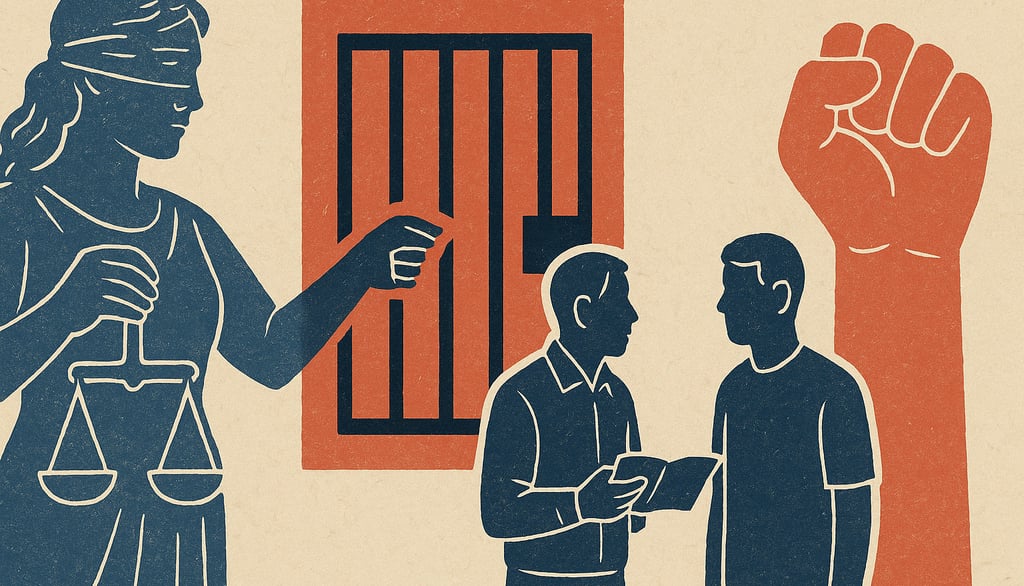Religious Freedom and Double Standards: What the 2024 USCIRF Report Leaves Out
The 2024 USCIRF report highlights persecution of Jehovah’s Witnesses worldwide — but what happens when an organization demands freedom externally while denying it internally? A closer look at the tension between human rights and organizational control.
TTATT
Oliver
4/22/20253 min read


A recent report from the U.S. Commission on International Religious Freedom (USCIRF) takes a fresh look at the ongoing persecution of Jehovah’s Witnesses in 2024. The document offers a global snapshot of how this religious community is being treated by governments around the world — from outright bans and imprisonment to subtler forms of legal and social discrimination. It’s a sobering read, especially for those of us who’ve spent time inside the organization and understand both the external pressures and the internal contradictions that come with being one of Jehovah’s Witnesses.
Let me say this upfront: persecution is real. State-sponsored repression of peaceful religious activity is always a human rights issue, full stop. And no matter what you think of the Jehovah’s Witnesses as a religion or organization (and I have a lot of thoughts), no one deserves to be tortured, jailed, or stripped of legal recognition for reading the Bible or refusing military service.
But as someone familiar with the inner workings of the group, reading this kind of report is always... complicated.
Because while the Watchtower often paints itself as a heroic spiritual underdog — "hated for Jesus’ name," just like they told us at the meetings — it’s also an organization that systematically silences dissent, breaks up families, and punishes those who dare to question the narrative. In other words: it’s entirely possible to be both persecuted and guilty of harming your own members.
And that’s the tension the USCIRF report, understandably, doesn’t address.
Let’s talk Russia
According to the report, since Russia declared Jehovah’s Witnesses "extremist" in 2017, over 800 criminal cases have been opened. As of late 2024, more than 140 JWs are behind bars or under house arrest. Sentences are becoming harsher — some exceeding eight years in prison — for things like organizing a Bible study. There's also documented torture: beatings, waterboarding, even electrocution.
That’s horrifying. It also fits Russia’s broader pattern of crushing independent civil society groups, whether they’re religious minorities, journalists, or LGBTQ+ organizations. Russia doesn’t just have a JW problem — it has a human rights problem.
But persecution has PR value
Inside the JW organization, persecution isn’t just a tragedy — it’s a narrative asset. It reinforces their apocalyptic worldview, fuels internal solidarity, and — let’s be honest — helps deflect attention from internal abuse. It’s hard to talk about shunning policies, cover-ups, or doctrinal inconsistencies when the headline is “Man sentenced to 8 years for praying.”
That doesn’t make the persecution less real. But it does mean that some suffering gets amplified for strategic purposes, while other types (like the emotional toll of disfellowshipping) are swept under the rug.
Other countries, same playbook
The report details abuses in Eritrea (indefinite detention without trial), Tajikistan (registration bans), Turkmenistan (harassment and threats), and several others. Even in countries where JWs are technically legal, like Kazakhstan or Uzbekistan, they face red tape, surveillance, and fines for preaching.
And then there's Japan — a more nuanced case. After the assassination of Shinzo Abe and the fallout around the Unification Church, Japan introduced new guidelines to prevent religiously motivated child abuse. While the intent may have been good, the vague wording opened the door to discrimination. JWs in Japan report a massive spike in hate incidents — 638% in one year, including death threats and school bullying.
At the same time, many in Japan have also spoken out about emotional abuse within the religion — fear of Armageddon, shunning, medical coercion. So while state overreach is a problem, it’s not coming out of nowhere.
Two things can be true
Jehovah’s Witnesses do not deserve to be tortured, jailed, or silenced by governments. Period.
Jehovah’s Witnesses also do not get to pretend they’re champions of freedom while punishing members for asking questions, expressing doubts, or walking away.
Religious freedom means freedom of conscience. That includes the right to believe — and the right to stop believing. The right to worship — and the right to critique. The right to knock on doors — and the right to say, “Not anymore.”
This is what many of us understand deeply. That freedom is fragile. That oppression can come in multiple forms. And that the same group crying persecution on the world stage may still be enforcing silence, shame, and control behind closed Kingdom Hall doors.
